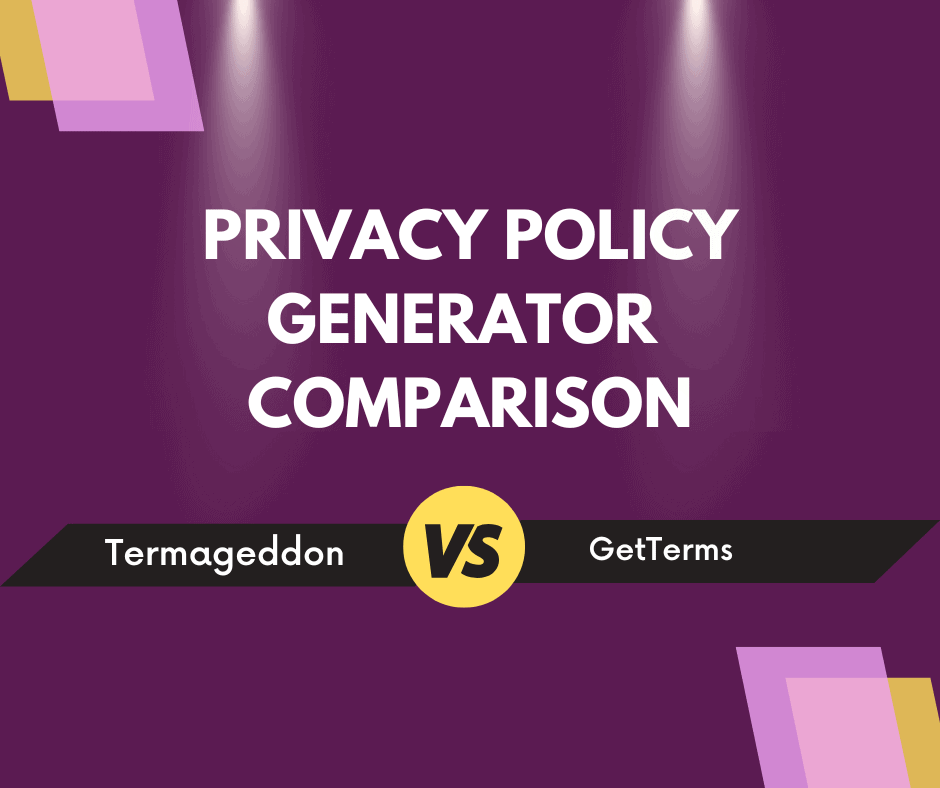There’s no shortage of Privacy Policy Generators out there. So, which is best?
Well, we might not be able to tell you that, but we can compare two of the most popular options out there: Termageddon and GetTerms.
Table of Contents
Pricing
Termageddon
Price:
$12/month or $119/year for one license.
Includes:
- Privacy Policy, Terms of Service, Disclaimer, Cookie Policy, End User License Agreement for one website or application
- Cookie consent banner for up to 50,000 users sessions per month
- All privacy laws and all clauses
- Automatic updates
- Unlimited edits to your policies
- Policies with no Termageddon logo/branding
GetTerms
Price:
Free plan
- Privacy Policy
- A generic, template-style policy that doesn’t comply with any privacy laws
- Cannot edit your Privacy Policy
- Privacy Policy is not tailored to your responses
$5/month or $149/year plan
- Privacy Policy
- Terms of Use
- Cookie Policy (but not Cookie Consent Banner)
- Acceptable Use Policy
- Includes the privacy laws they cover
- Can edit your policy
- Customizable disclosures
Policies Offered
Termageddon
- Privacy Policy
- Cookie Policy
- Disclaimer
- End User License Agreement
- Terms of Service (includes Cancellation Policy, Shipping Policy, Refund and Return Policy, and Acceptable Use Policy)
GetTerms
- Privacy Policy
- Cookie Policy
- Terms of Use
- Acceptable Use Policy
Cookie Consent Banner Offered and Features
Termageddon (in partnership with Usercentrics)
- Covers the following privacy laws: GDPR, UK DPA, ePrivacy Directive, CCPA/CPRA, PIPEDA
- Includes: website scanner for cookies
- Automatically blocks certain cookies until a user accepts those cookies
- Includes: consent and preference tracking
- Includes: Do not sell my personal information banner
- Includes: option to change the default text in the cookie consent banner
- Includes feature for changing consent settings or withdrawing consent
- Termageddon’s Privacy Policy generator informs you whether you need to have a cookie consent banner
GetTerms
- Does not offer a cookie consent banner
Support
Termageddon
- Phone
- Support portal where you can send a message
- Support portal where you can read support articles
GetTerms
- Contact form on website
Privacy laws covered
Termageddon
- Australia Privacy Act 1988
- CalOPPA
- CPRA
- DOPPA
- GDPR
- UK DPA 2018
- Nevada Revised Statutes Chapter 603A
- PIPEDA
- VCDPA
- Colorado Privacy Act
- Connecticut SB6
- Quebec Law 25
- UCPA
Termageddon will also cover the following laws once they go into effect.
- Iowa SF262 (effective date January 1, 2025)
- Indiana SB5 (effective date July 1, 2026)
- Tennessee Information Protection Act (TIPA – effective date July 1, 2025)
- Montana Consumer Data Privacy Act (MCDPA – effective date October 1, 2024)
- Texas Data Privacy and Security Act (TDPSA – effective date July 1, 2024)
- Oregon Consumer Privacy Act (OCPA – effective date July 1, 2024)
- Delaware Personal Data Privacy Act (DPDPA)
GetTerms
- GDPR
- CCPA (which is outdated, the new law is CPRA)
- CalOPPA
Automatic updates
Termageddon
- Automatic updates offered on all policies
- Updates have been made on time for every new privacy law and regulations.
- Has a state privacy bill tracker
GetTerms
- Does not claim to auto-update policies
Expertise
Termageddon
- President – Donata – is a licensed attorney and Certified Information Privacy Professional, as well as the Chair of the Chicago Bar Association’s Privacy and Cybersecurity Committee. She is also a Fellow of the American Bar Foundation, a member of the American Bar Association’s Science and Technology Council, and a member of the ABA’s Cybersecurity Legal Task Force.
GetTerms
- No information regarding employee expertise on website or LinkedIn.
Does it help you figure out what privacy laws apply to you?
Termageddon
- Yes. The first page of the Privacy Policy questionnaire helps determine what privacy laws apply to you. The rest of the questionnaire is based upon the disclosures required by those laws.
GetTerms
- No, the interface just asks you which of the three laws they cover that you’d like to comply with.
Privacy Policy generation process
Termageddon
- First page of the questionnaire actually helps determine what privacy laws apply to you;
- The questionnaire includes all of the questions needed to create the disclosures required by the privacy laws that apply to you;
- We don’t make assumptions nor insert generic information for these disclosures;
- Privacy Policy combines all privacy laws that apply to you and does not include separate sections for each privacy law because that practice makes no sense.
GetTerms
- Asks you to select the privacy laws that apply to you at the very bottom of the questionnaire (This isn’t ideal as there needs to be follow-up questions to ensure the policy has all the disclosures required by those laws)
- Fails to ask how a website secures personal information
- Policy contains several examples of default text that assumes certain information that was never verified by the generator
- No questions about the legal bases of processing information (required under GDPR)
- No questions about whether a website sells personal information (required by CPRA)
Conclusion
Hopefully this blog helps you narrow down your options for the perfect Privacy Policy Generator for you. As a Termageddon blog, we obviously recommend Termageddon because it:
- Is founded by a privacy attorney
- Adapts and changes depending on how you answer questions
- Automatically updates all policies when laws change or go into effect
- Offers a single price for all the policies a website needs (no up-charges as you go through the generation process)
- Is trusted by thousands of web agencies who use Termageddon to protect their own clients
If you think Termageddon meets your needs, you can find our Privacy Policy Generator here.




